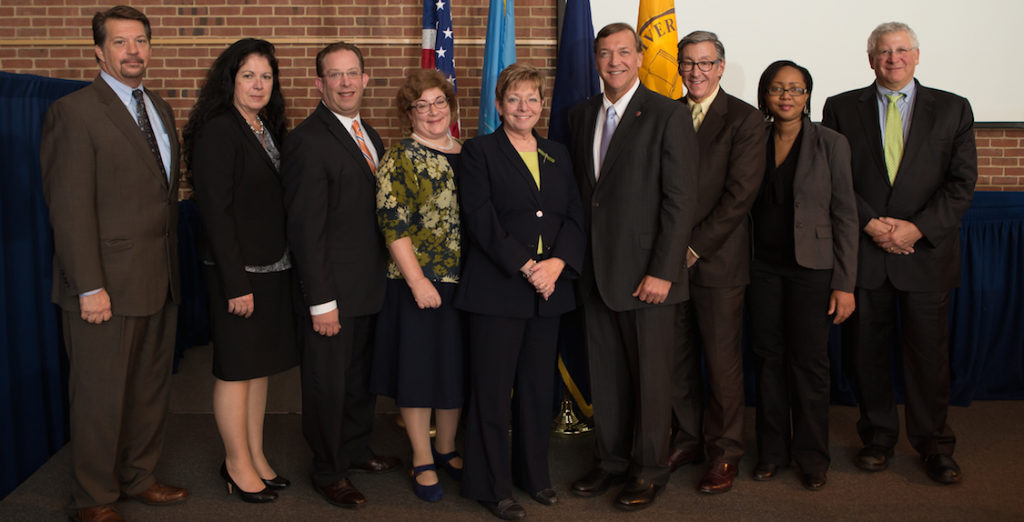A thought-provoking discussion by a panel of experts launches the first in the Center for Health Innovation's Rapid Response series.
Author Stephen King described it as “one of the most horrifying things I’ve read in my whole life.” The so-called master of horror wasn’t referring to one of his own stories but to Richard Preston’s bestselling 1995 nonfiction thriller The Hot Zone, which introduced millions of readers to Ebola and its devastating effects.
Fast-forward to 2014 and the largest Ebola outbreak in history. We’re inundated with reports and images of suffering victims waiting outside overwhelmed hospitals, travelers being screened at airports and healthcare workers engulfed in head-to-toe protective equipment to avoid infection. And The Hot Zone has been propelled back to the bestseller lists. Could the New York metropolitan region, a hub for international travel, be the gateway for an Ebola outbreak on our shores? Is Long Island prepared if this should occur? Can you get Ebola from a bowling ball? Or are we needlessly panicking?
Addressing concerns and educating both healthcare workers and the general public about Ebola was a natural fit for the Center for Health Innovation (CHI), which aims “to be a local thought leader and think tank for emerging and urgent public health issues,” according to Elizabeth Gross Cohn, Ph.D., director. The panel discussion on November 6, 2014, titled “Ebola and Beyond: Are We Ready?” was the first in CHI’s Rapid Response series, which will “bring together content experts and key stakeholders to explore the economic, political, social, environmental and cultural aspects of emerging public health issues from a transdisciplinary perspective,” she said.
Dr. Cohn engaged Samuel L. Stanley Jr., M.D., president of Stony Brook University and one of the nation’s leading experts in virology and infectious disease research, to present the keynote and moderate the panel discussion. The panelists represented a local who’s who of healthcare leadership and expertise:
- L. Reuven Pasternak, M.D., CEO and vice president for health systems at Stony Brook University Hospital
- Victor F. Politi, M.D., FACP, FACEP, president and CEO of the NuHealth System (Nassau Health Care Corporation)
- Donna Armellino, R.N., D.N.P., C.I.C., vice president for infection prevention at North Shore-LIJ Health System
- Lawrence Eisenstein, M.D., FACP, commissioner of the Nassau County Department of Health
- Barry Rosenthal, M.D., director of Winthrop-University Hospital, Department of Emergency Medicine
- Zainab Attahiru, M.S.N., R.N., nurse researcher and Jonas Nurse Leader Scholar, who spoke of her nursing experiences in Sierra Leone
The event generated so much interest that the location was moved from Alumni House to the larger Thomas Dixon Lovely Ballroom in the Ruth S. Harley University Center. Dr. Cohn said that in addition to the 170 audience members, the event was streamed live to roughly 30 institutions from Suffolk County to New York City and Washington, D.C., and is available online (scroll down or click to access), where it has garnered more than 200 views.
Philip Alcabes, Ph.D., a professor in Adelphi’s College of Nursing and Public Health and author of Dread: How Fear and Fantasy Have Fueled Epidemics From the Black Death to Avian Flu, started off the evening by providing historical context and stressing the importance of distinguishing between facts and fears. He was followed by Dr. Stanley, who gave a crash course on evolving, mutating microbes; the pathogenesis, clinical manifestations, ecology and epidemiology of Ebola; biosecurity in a flat world; and potential Ebola drugs, diagnostics and vaccines in the pipeline.
The discussion then turned to how Long Island is preparing for the Ebola threat. Panelists assuaged fears and concerns by explaining that Ebola is not airborne and how their facilities have taken steps to treat infected patients and train healthcare workers and emergency responders.
As Laura Wachel, an undergraduate nursing student at Adelphi, noted, “They debunked the myths” perpetuated by those “looking at this from an emotional rather than scientific point of view.”
The discussion went beyond Ebola (as Dr. Stanley stated, “More people will die of influenza during this flu season”) and beyond our borders. Panelists emphasized that as humanitarians, we have a responsibility to address what Attahiru described as the “fear, anguish and hopelessness” in Sierra Leone by investing in biomedical research and public health infrastructure on a global level. Perhaps the real horror story here is not a deadly virus but human indifference. As Dr. Alcabes noted, “If there’s a real crisis in America, it’s that we’re not terribly interested in western Africa and most of the poor world.”
“We know that what happens around the world will impact us here,” Dr. Eisenstein said. “While we are saddened by the tragic events that have led to this and the lives that have been lost, a lot of good can come of this and many, many lives can be saved.” He added that when we invest in public health, “the whole world benefits from it.”
For further information, please contact:
Todd Wilson
Strategic Communications Director
p – 516.237.8634
e – twilson@adelphi.edu
